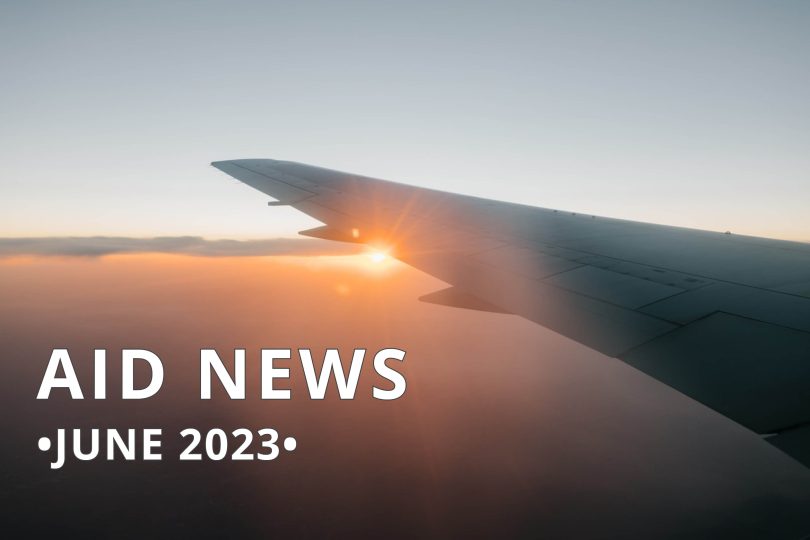Our monthly update of news and analysis on aid and international development, with a focus on Australian aid.
Australian aid
Australia’s new international development policy is still awaiting release.
Australia has pledged a A$110 million military and humanitarian assistance package to Ukraine, including $10 million to the Ukrainian Humanitarian Fund (UHF) administered by the United Nations Office for the Coordination of Humanitarian Affairs (UNOCHA). In 2022, Australia contributed A$29 million to the UHF and was the 13th largest government donor.
Australia announced new commitments of A$10.5 million to Myanmar and A$2 million to Bangladesh to meet humanitarian needs created by Tropical Cyclone Mocha. However, Myanmar’s State Administration Council has suspended humanitarian access to Rakhine State, leaving more than one million vulnerable people without assistance. As of 16 June, only US$ 21.7 million out of US$333 million to Myanmar requested by the UN had been received.
Following on from the A$6 million of humanitarian aid announced in May, Australia has pledged a further A$4.45 million to Sudan to provide immediate life-saving protection and assistance.
The Minister for International Development and the Pacific, Pat Conroy, attended the G20 Development Ministers’ Meeting in Varanasi, India. An action plan to accelerate progress on the Sustainable Development Goals (SDGs) was released following the meeting, focusing on digital transformation, gender equality and women’s empowerment, and sustainable and inclusive global transitions.
The Labor MP for Freemantle, Josh Wilson, made the case for development assistance in the Australian Parliament. He said, “There’s no better way to strengthen security, stability and regional prosperity than through properly designed and delivered development assistance, which of course depends on a skilful and properly supported Australia aid program.”
Regional/global aid
Canada has frozen cooperation with the China-led Asian infrastructure Investment Bank (AIIB) and has begun a review of allegations that the bank is “dominated by the Communist Party”. The allegations were brought by Canadian Bob Pickard, who worked as the bank’s global communications director prior to his resignation.
At the High-level Dialogue on Global Development, Chinese President Xi Jinping announced China’s intention to allocate more resources to global development cooperation, including upgrading the South-South Cooperation Assistance Fund to a Global Development and South-South Cooperation Fund, increasing commitment to the fund from US$3 billion to US$4 billion, and increasing China’s input to the UN Peace and Development Trust Fund. China’s Center for International Knowledge on Development has issued a Progress Report on the Global Development Initiative.
France hosted an international Summit for a New Global Financing Pact to address climate change, protect nature and meet development challenges through a more inclusive international financial system. The summit made a number of proposals including reforms of multilateral development banks to increase international liquidity and mobilise climate funding, and released a draft roadmap to achieve key milestones by September 2024.
Japan has revised its Development Cooperation Charter to address compound crises including climate change and infectious diseases, challenges to free and open international order, and humanitarian crises. The revised development cooperation charter aims to make a more active contribution to the rule-based international community while safeguarding Japan’s national interests.
To meet the US budget caps, Republican Kay Granger, Chairwoman of the House Appropriations Committee, has proposed deep cuts to appropriation levels enacted in December 2023, including a 30.7% cut on State Foreign Operations, which would result in a significant reduction in funding for foreign aid programs.
Six years after the US withdrew from the UN Educational, Scientific and Cultural Organization, the US plans to rejoin UNESCO and pay more than US$600 million in dues amid concerns over Chinese influence.
Books, reports, articles, podcasts, etc.
To explore the potential of an Australia-France partnerships in the region, the Asia-Pacific Development, Diplomacy and Defence Dialogue (AP4D) has released a report outlining ways in which Australia and France can coordinate to maximise benefits for the region under a shared vision.
The Bill & Melinda Gates Foundation has released a white paper on Climate and Development Finance. The paper proposes a financing framework and reforms to the global financial architecture to increase resource allocation efficiency and address development issues while at the same time facing the climate change threat.
The Breakthrough Institute has examined the World Bank’s Climate Portfolio of 2554 projects between 2000 and 2022. The review found that the portfolio skewed towards climate mitigation rather than a balanced focus on mitigation and adaptation, and a significant number of climate projects have little to do with climate change.
Development Initiatives has published its Global Humanitarian Assistance Report for 2023, which shows that in 2022, the number of people in need of humanitarian assistance grew by 33% due to conflict, climate change, and socioeconomic threats, while international humanitarian assistance increased by 27%.
Lowy Institute has published the Southeast Asia Aid Map. The data shows that from 2015 to 2021, Southeast Asia received about US$28 billion in official development finance each year. Indonesia has been the largest recipient of aid in the region and China has been the region’s largest donor.
ODI brought together Stephen Dercon, author of the book Gambling on Development, and seven academics and practitioners to discuss the role of aid in countries with and without development bargains.
Disclosure
Material for this update has been collected by Devpol staff; editorial responsibility lies with Cameron Hill. Devpol’s work on Australian aid is supported by the Bill & Melinda Gates Foundation. The views represent those of Centre staff only.



Leave a Comment